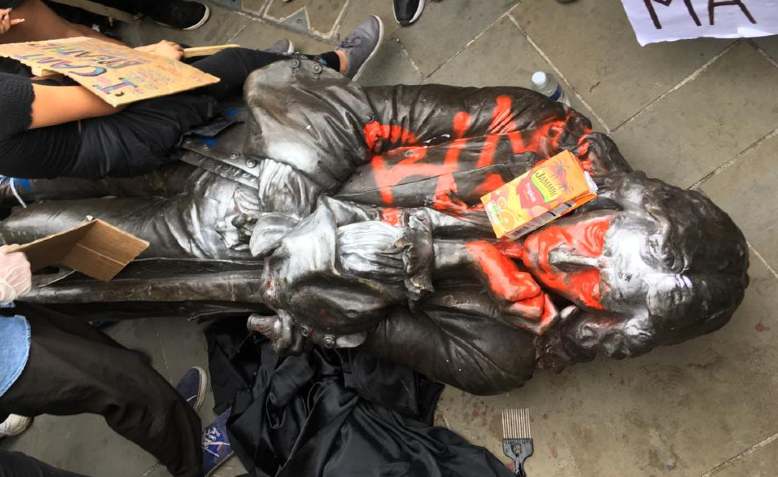 Edward Colston statue, toppled. Photo: Susan Newman and Jeni Van Heerden
Edward Colston statue, toppled. Photo: Susan Newman and Jeni Van Heerden
The prosecution against the four Black Lives Matter activists who pulled down Edward Colston’s statue must be stopped, argues Shabbir Lakha
The toppling of Edward Colston’s statue in Bristol was one of the most electrifying moments of the summer. It was a near-spontaneous moment of direct confrontation with a racist system that remains wedded to celebrating its history of racial subjugation.
The statue’s removal was supported by a majority of people not just in Bristol but nationally. And it happened as part of the mobilisation of hundreds of thousands of people demanding that Black Lives Matter from Parliament Square to high streets in remote villages on the outskirts of Durham, and millions more internationally.
That four people have now been charged with criminal damage for the statue’s removal is an outrage. We are faced with the absurd reality where the inheritors of profits from slavery are still living with their wealth and the public money used to compensate slave owners after abolition was still being paid off until 2015 – but tearing down a symbol celebrating those responsible for enslavement is a criminal offence.
Colston’s statue wasn’t just a relic, it was a living symbol of the continuing oppression of black people in this country. Colston was a 17th century merchant and slave trader who was a high official of the Royal African Company, traded slaves privately and as a Tory MP for Bristol vociferously defended the slave trade.
This is not a man who should be celebrated with an 8ft bronze statue in the centre of the city. Campaigners had long petitioned for the statue’s removal to no avail. Even an attempt to change the statue’s plaque from referring to him as “one of the most virtuous and wise sons” of Bristol was effectively blocked by the Society of Merchant Venturers which Colston had been a member of.
The statue remaining in all its glory was an affront to the multicultural residents of Bristol. It was completely right that it was pulled down. Its removal sparked the removal of the statues of Leopold II in Belgium, Robert Milligan in London, at least 33 statues of Christopher Columbus around the US and an agreement to remove Cecil Rhodes from Oxford University.
There’s no doubt that the actions of protesters in Bristol that day resonated internationally and had a huge impact on the conversation about racism, its roots and how embedded it remains in society today.

There’s no validity to the claims of erasing history. More people now know about Colston – and what he should really be remembered for – than before the statue was removed. The statue’s removal was itself a historic moment.
But Boris Johnson called protesters “thugs”, Priti Patel called the removal “utterly disgraceful” and Keir Starmer said it was “completely wrong”. The motivation to prosecute those identified with the statue’s removal is clearly political.
The current Mayor Marvin Rees, the former Mayor George Ferguson – even the Merchant Venturers – have said the statue should have been removed. Even if they object to how it was removed, and they really shouldn’t given their failure to do it themselves, how is there any legitimacy to prosecuting those who removed it?
It’s a message from the state which pretends to uphold liberal values that you can only be anti-racist on its terms, and that isn’t really anti-racist at all. You can talk about why racism is bad, within limits, but don’t dare take action. This establishment backlash to Black Lives Matter and attempt to criminalise protest must be resisted.
Avon and Somerset police, notorious for tasering Ras Judah, a black man in his sixties and their own race relations officer, and found to be “institutionally racist” for negligence around the murder of Bijan Ebrahimi, was able to provide the CPS with a quick and thorough investigation of those involved in pulling down the statue.
So now the full weight of the movement must come out in defence of Rhian Graham, Milo Ponsford, Jake Skuse and Sage Willoughby who have been charged and demand the charges are dropped. Standing up against racism is not a crime. No justice, no peace.
Join Revolution! May Day weekender in London
The world is changing fast. From tariffs and trade wars to the continuing genocide in Gaza to Starmer’s austerity 2.0.
Revolution! on Saturday 3 – Sunday 4 May brings together leading activists and authors to discuss the key questions of the moment and chart a strategy for the left.

